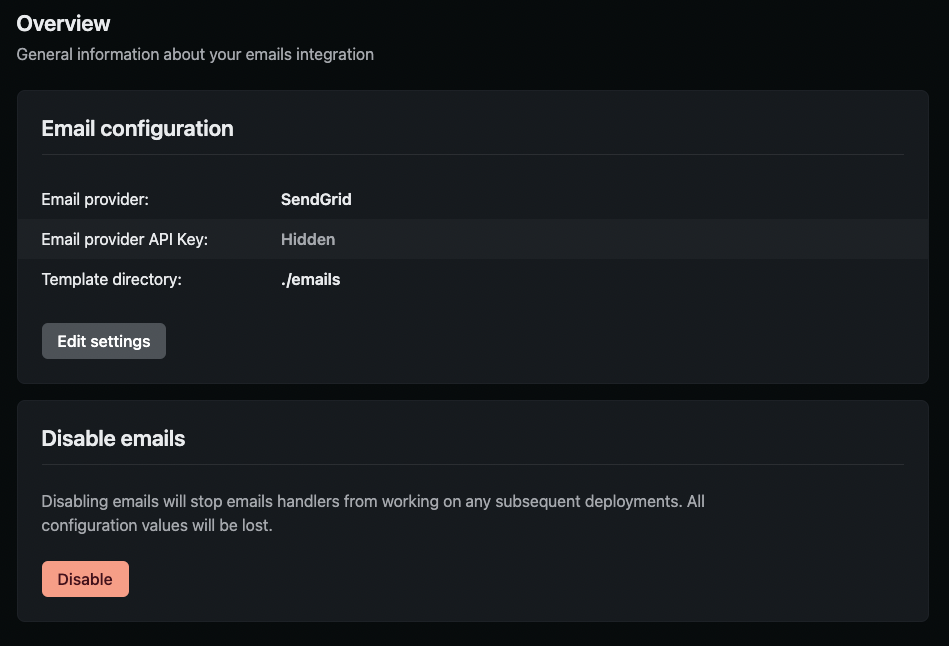
Product
Introducing Rust Support in Socket
Socket now supports Rust and Cargo, offering package search for all users and experimental SBOM generation for enterprise projects.
@netlify/plugin-emails
Advanced tools
A build plugin that creates an email handler and processes requests to send emails
🚧 Note: This plugin is pre-release software. Until version 1.0.0 is released, its API could change at any time.
The Netlify emails build plugin is responsible for creating a serverless function to handle email requests, using the email request to populate provided email templates and sending them using the specified email API provider.
Full documentation for the Netlify Email Integration can be found here.
You must setup an account with one of our supported email providers listed above. You will also need to ensure your account is verified by the email provider and you have provided authorisation for emails to be sent from any email address you send from.
Add it to your site via the Netlify app under Integrations - (app.netlify.com/integrations/{your-sitename}/emails).
When enabling the plugin via Integrations, you should add the required configuration variables to complete the configuration step.

Now that the setup is complete, create an email directory ./emails (default) or use a custom directory, as long as you define it in your Email Settings under ‘Template directory’.
Each email template should be stored under a folder name that represents the route of your template and the email file should be named index.html. E.g. ./emails/welcome/index.html.
If there are variables that need replacing in your email template when the email is triggered, please use the handlebars.js syntax and pass the arguments in the request as shown in Step 5 below.
Sample email with parameters:
<html>
<body>
<h1>Welcome, {{name}}</h1>
<p>We hope you enjoy our super simple emails!</p>
</body>
</html>
Visit http://localhost:{PORT}/.netlify/functions/emails/_preview to preview your email templates.
Please note, this preview endpoint is not made available in production and is only made available locally.
Dependent on where you would like to trigger an email being sent (on a subscribe or data request button click, when an event is triggered, etc.), add this snippet to your code that is reacting to that event.
import fetch from 'node-fetch'
await fetch(
`${process.env.URL}/.netlify/functions/emails/welcome`,
{
headers: {
"netlify-emails-secret": process.env.NETLIFY_EMAILS_SECRET,
},
method: "POST",
body: JSON.stringify({
from: "no-reply@yourdomain.com",
to: "alexanderhamilton@test.com",
cc: "cc@test.com",
bcc: "bcc@test.com",
subject: "Welcome",
parameters: {
products: ["product1", "product2", "product3"],
name: "Alexander",
},
}),
}
);
You can also trigger the email locally by running netlify build, then netlify dev and making the above request.
FAQs
A build plugin that creates an email handler and processes requests to send emails
The npm package @netlify/plugin-emails receives a total of 2,044 weekly downloads. As such, @netlify/plugin-emails popularity was classified as popular.
We found that @netlify/plugin-emails demonstrated a not healthy version release cadence and project activity because the last version was released a year ago. It has 19 open source maintainers collaborating on the project.
Did you know?

Socket for GitHub automatically highlights issues in each pull request and monitors the health of all your open source dependencies. Discover the contents of your packages and block harmful activity before you install or update your dependencies.

Product
Socket now supports Rust and Cargo, offering package search for all users and experimental SBOM generation for enterprise projects.

Product
Socket’s precomputed reachability slashes false positives by flagging up to 80% of vulnerabilities as irrelevant, with no setup and instant results.

Product
Socket is launching experimental protection for Chrome extensions, scanning for malware and risky permissions to prevent silent supply chain attacks.